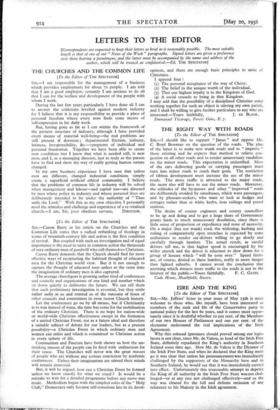[To the Editor of THE SPECTATOR]
Snt,—Canon Barry in his article on the Churches and the Common Life states that a radical rethinking of theology in terms of twentieth-century life and action is the first condition of revival. But coupled with such an investigation and of equal importance is the need to unite in common action the thousands of very ordinary men of goodwill who call themselves Christians.
Canon Barry demands that the Church should find far more effective ways of recapturing the habitual thought of educated men for the Christian world view. But it is not enough to capture the thought of educated men unless at the same time the imagination of ordinary men is also captured.
The average churchgoer is growing rather tired of conferences and councils and organisations of one kind and another which sit down quietly to deliberate the future. We can tell them that such preliminary investigation is essential, but they smile rather sadly at us and remind us of the outcome of hosts of other councils and committees in even recent Church history.
Let the conferences go on by all means, but if Christianity is to wax instead of wane, the time has come for the mobilisation of the ordinary Christian. There is no hope for nation-wide or world-wide Christian effectiveness except in the formation of a. united Christian Front, not as a future ideal and therefore a suitable subject of debate for our leaders, but as a present possibility—a Christian Front in which ordinary men and women can enlist and which is committed to Christian action in every sphere of life.
Communism and Fascism have both shown us how the un- thinking masses of the people can be fired with enthusiasm for their cause. The Churches will never win the great masses of people who are without any serious conviction by academic conferences. Unless their imaginations are stirred their minds will remain unmoved.
But, it will be argued, how can a Christian Front be formed unless we know exactly for what we stand ? It would be a mistake to wait for a detailed programme before any move was made. Methodism began with the simplest rules 'of the " Holy Club," Democracy only became self-conscious late in its devel- opment, and there are enough basic principles to unite al Christians.
I append four : (t) The personal acceptance of the way of Christ.
(2) The belief in the unique worth of the individual.
(3) That our highest loyalty is to the Kingdom of God.
(4) A social crusade to bring in that Kingdom.
I may add that the possibility of a disciplined Christian army working together for such an object is stirring my own parish, and I shall be willing to give further particulars to any who are


















































 Previous page
Previous page